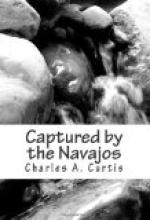I felt a little delicacy about breaking in upon this scene and letting the boy know I had overheard all his fond talk to Vic, so withdrew into a clump of bushes and began calling the dog.
Henry promptly answered: “Here she is, sir. This way. She wants to come, but I think she had better not.”
“Is she much hurt?” I asked, approaching them.
“Not dangerously, sir. This arrow passed through the top of her neck. I notched it and broke it, so as not to be obliged to draw the barb or plume through the wound. She is weak from her long run and loss of blood. The wound might be bound up if her collar was off.”
“I will remove it and not put it on again until the sore heals,” I answered, and, taking a key from my pocket, I took off the collar and assisted in dressing the wound.
After petting Vic for a while, and using quite as much “baby talk” in doing so as Henry had in dressing the wound, I asked the boy how he came to return with the cavalry.
“I ran ahead, as you told me to, sir, and the wagon-master came to meet me. He lent me his mule, and I rode on to Captain Bayard and made my report. The captain sent Lieutenant Baldwin and his men, and lent me a spare horse to come along as guide.”
“Have you seen Chiquita?”
“At a distance. Is she all right?”
“Yes, but very tired. Let us join the troop, for it is time we were on our way to the train.”
Our return ride was at a walk. Henry turned his cavalry horse over to a trooper to be led, and mounted Chiquita with Vic in his arms. Arrived in camp he took the dog to the surgeon for treatment, and in a few days she was as lively as ever.
VIII
OVER THE DIVIDE—A CORPORAL MISSING
Fort Wingate was reached in two more marches—six in all from the Rio Grande—and we went into camp for two days for rest and some needed repairs to wagons before undertaking the second and longer section of our military journey—a section upon which at that time no white man had set up a home.
Recalling my promise to the priest who had interviewed me in behalf of Senora Perea, I made inquiries of the Port Wingate officers concerning her son. None of them had heard more than she already knew, but a scout claimed he had recently seen a Mexican boy herding ponies for the Navajo chief Elarnagan, thirty miles north of Zuni.
The evening before resuming our march Captain Bayard informed me that there was an emigrant family camped half a mile to the west of Fort Wingate, which had been awaiting our arrival in order to travel to Arizona under our protection. He told me to assign the family a place in the train.




